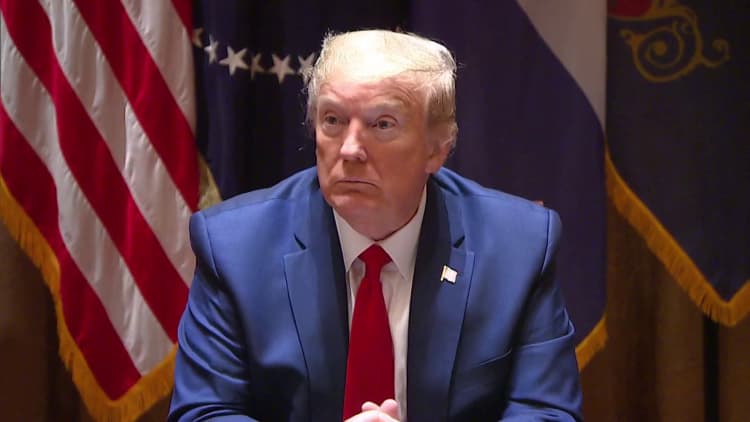KEY POINTS
- Top coronavirus health expert Dr. Anthony Fauci’s recent warning about the potentially dire consequences of reopening states and schools too soon was “not an acceptable answer,” President Donald Trump said Wednesday.
- Trump told reporters at the White House that he was “surprised” by Fauci’s answers during a hearing before the Senate Committee on Health, Education, Labor and Pensions.
- Trump did not single out which specific answer from Fauci that he found unacceptable, but referenced Fauci’s testimony about reopening schools in the fall.
Trump says Fauci’s warnings about reopening amid coronavirus crisis are not ‘acceptable’
PUBLISHED WED, MAY 13 20206:16 PM EDTUPDATED WED, MAY 13 20206:38 PM EDTKevin Breuninger@KEVINWILLIAMBChristina Wilkie@CHRISTINAWILKIEKEY POINTS
- Top coronavirus health expert Dr. Anthony Fauci’s recent warning about the potentially dire consequences of reopening states and schools too soon was “not an acceptable answer,” President Donald Trump said Wednesday.
- Trump told reporters at the White House that he was “surprised” by Fauci’s answers during a hearing before the Senate Committee on Health, Education, Labor and Pensions.
- Trump did not single out which specific answer from Fauci that he found unacceptable, but referenced Fauci’s testimony about reopening schools in the fall.

WATCH NOWVIDEO00:51President Trump disagrees with Dr. Fauci on reopening schools
Top coronavirus health expert Dr. Anthony Fauci’s recent warning about the potentially dire consequences of reopening states and schools too soonwas “not an acceptable answer,” President Donald Trump said Wednesday.
Trump told reporters at the White House that he was “surprised” by Fauci’s answers during a hearing before the Senate Committee on Health, Education, Labor and Pensions.
Trump did not single out which specific answer from Fauci that he found unacceptable, but referenced Fauci’s testimony about reopening schools in the fall.
Fauci, the director of the National Institute of Allergy and Infectious Diseases and a member of the White House task force, said at the hearing that he doubted that an effective vaccine or treatment for the virus would be available by the fall when schools are set to reopen.
“In this case that the idea of having treatments available or a vaccine to facilitate the reentry of students into the fall term would be something that would be a bit of a bridge too far,” he said.
He later added: “We just have to see on a step-by-step basis as we get into the period of time with the fall about reopening the schools, exactly where we will be in the dynamics of the outbreak.
Fauci also said that reopening states too soon amid the Covid-19 crisis could bring even more “suffering and death,” and that he was concerned that rushing to reopen “would almost turn the clock back rather than going forward.”
His testimony came as more governors start to relax their strict social distancing rules, which are intended to slow the spread of the virus but have ground the U.S. economy to a virtual halt in the process. Trump has cheered on some of the state leaders who are pushing to reopen the businesses that had been shut down amid the crisis.
Asked if he agreed with Fauci’s concerns, Trump said, “Look, he wants to play all sides of the equation.”
“I was surprised by his answer, actually” Trump said when asked for clarification. “To me it’s not an acceptable answer, especially when it comes to schools.”
“The only thing that would be acceptable, as I said, would be professors, teachers, et cetera, over a certain age,” Trump added. “Because this is a disease that attacks age, and it attacks health.”
Students and young children, the president added, are statistically far less vulnerable to the disease.
That sentiment also clashed with Fauci, who said during a testy exchange with Kentucky Republican Sen. Rand Paul that “I think we better be careful that we’re not cavalier in thinking that children are completely immune to the deleterious effects” of Covid-19.
The official position of the White House is that it should be left to individual governors whether to follow the guidelines set out by the Centers for Disease Control, which describe criteria that states should reach before they begin a phased reopening.
These include a downward trajectory in the number of “positive tests” or “documented cases” of coronavirus for at least two consecutive weeks. Other recommendations include being able to provide “robust contact tracing” for people who test positive, and “surveillance testing” for high-risk groups. But many states are reopening despite not having met these criteria, a move that experts like Fauci say could put lives at risk.
Texas and Colorado, for example, have yet to see two weeks straight of steadily decreasing cases, but they are nonetheless moving ahead with plans to restart their economies and reopen businesses.
